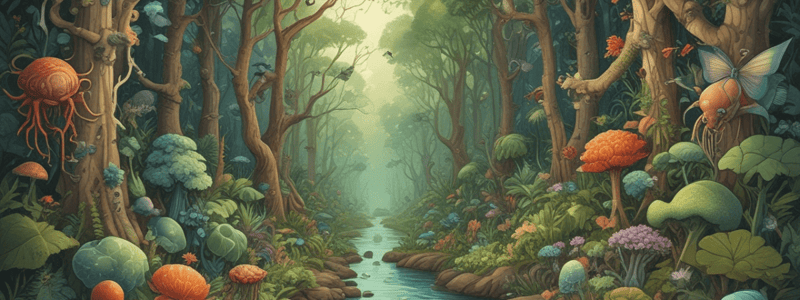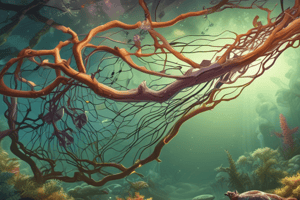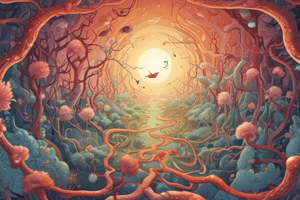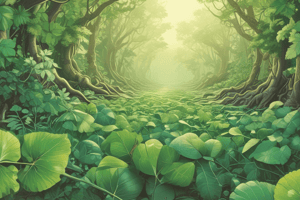Podcast
Questions and Answers
What is the scientific study of life and living organisms?
What is the scientific study of life and living organisms?
- Botany
- Ecology
- Genetics
- Biology (correct)
What is the study of the structure and function of biomolecules such as DNA, proteins, and cells?
What is the study of the structure and function of biomolecules such as DNA, proteins, and cells?
- Biochemistry
- Cellular Biology
- Molecular Biology (correct)
- Microbiology
What is the process by which plants convert light energy into chemical energy?
What is the process by which plants convert light energy into chemical energy?
- Gene Expression
- Homeostasis
- Photosynthesis (correct)
- Cellular Respiration
What is the site of protein synthesis in a cell?
What is the site of protein synthesis in a cell?
What is the study of heredity, genes, and genetic variation?
What is the study of heredity, genes, and genetic variation?
What is the theory that explains how species change over time?
What is the theory that explains how species change over time?
What is the function of the cell membrane?
What is the function of the cell membrane?
What is the term for the set of chemical reactions that occur within an organism?
What is the term for the set of chemical reactions that occur within an organism?
Flashcards are hidden until you start studying
Study Notes
Definition and Scope
- Biology is the scientific study of life and living organisms, including their structure, function, growth, evolution, distribution, and taxonomy.
- It explores the diversity of life, from molecules to ecosystems, and examines the interactions between organisms and their environment.
Branches of Biology
- Botany: study of plants and plant-like organisms
- Zoology: study of animals and animal-like organisms
- Microbiology: study of microorganisms such as bacteria, viruses, and fungi
- Ecology: study of the interactions between organisms and their environment
- Genetics: study of heredity, genes, and genetic variation
- Biochemistry: study of the chemical processes that occur within living organisms
- Molecular Biology: study of the structure and function of biomolecules such as DNA, proteins, and cells
- Cellular Biology: study of the structure, function, and behavior of cells
- Evolutionary Biology: study of the processes that have shaped the diversity of life on Earth
- Biophysics: study of the physical principles underlying biological processes
Biological Molecules
- Carbohydrates: provide energy and structural support
- Proteins: perform a wide range of functions, including catalysis, transport, and regulation
- Lipids: provide energy and structural support, and serve as messengers
- Nucleic Acids: store and transmit genetic information (DNA and RNA)
Cell Structure and Function
- Cell membrane: regulates what enters and leaves the cell
- Cytoplasm: site of metabolic reactions and protein synthesis
- Nucleus: contains genetic material
- Mitochondria: site of cellular respiration
- Endoplasmic reticulum: involved in protein synthesis and transport
- Ribosomes: site of protein synthesis
Biological Processes
- Photosynthesis: process by which plants convert light energy into chemical energy
- Cellular Respiration: process by which cells generate energy from glucose
- Gene Expression: process by which genetic information is converted into a functional product
- Homeostasis: process by which organisms maintain a stable internal environment
- Metabolism: set of chemical reactions that occur within an organism
Evolution
- Theory of Evolution: explains how species change over time through natural selection, genetic drift, mutation, and gene flow
- Mechanisms of Evolution: mutation, gene flow, genetic drift, and natural selection
- Evidence for Evolution: fossil record, comparative anatomy, molecular biology, and biogeography
Definition and Scope
- Biology is the scientific study of life and living organisms, exploring diversity from molecules to ecosystems.
- It examines interactions between organisms and their environment.
Branches of Biology
- Botany studies plants and plant-like organisms.
- Zoology studies animals and animal-like organisms.
- Microbiology studies microorganisms such as bacteria, viruses, and fungi.
- Ecology studies interactions between organisms and their environment.
- Genetics studies heredity, genes, and genetic variation.
- Biochemistry studies chemical processes within living organisms.
- Molecular Biology studies structure and function of biomolecules like DNA, proteins, and cells.
- Cellular Biology studies structure, function, and behavior of cells.
- Evolutionary Biology studies processes that shaped life's diversity on Earth.
- Biophysics studies physical principles underlying biological processes.
Biological Molecules
- Carbohydrates provide energy and structural support.
- Proteins perform various functions: catalysis, transport, and regulation.
- Lipids provide energy, structural support, and serve as messengers.
- Nucleic Acids (DNA and RNA) store and transmit genetic information.
Cell Structure and Function
- Cell membrane regulates what enters and leaves the cell.
- Cytoplasm is the site of metabolic reactions and protein synthesis.
- Nucleus contains genetic material.
- Mitochondria is the site of cellular respiration.
- Endoplasmic reticulum is involved in protein synthesis and transport.
- Ribosomes are the site of protein synthesis.
Biological Processes
- Photosynthesis: plants convert light energy into chemical energy.
- Cellular Respiration: cells generate energy from glucose.
- Gene Expression: genetic information is converted into a functional product.
- Homeostasis: organisms maintain a stable internal environment.
- Metabolism: set of chemical reactions within an organism.
Evolution
- Theory of Evolution: species change over time through natural selection, genetic drift, mutation, and gene flow.
- Mechanisms of Evolution: mutation, gene flow, genetic drift, and natural selection.
- Evidence for Evolution: fossil record, comparative anatomy, molecular biology, and biogeography.
Studying That Suits You
Use AI to generate personalized quizzes and flashcards to suit your learning preferences.




